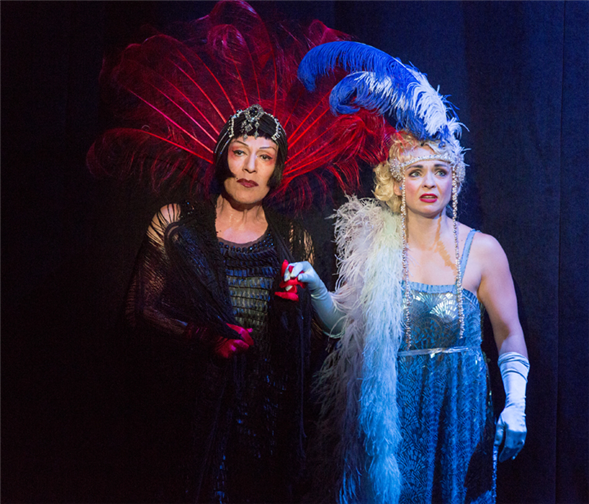Translate Page

In his new show, Basil Twist revives the Lewisohn sisters
---
Who are these delectable ladies? Clearly visitors from another era. We first glimpse them as ghostly figures wafting above a murky stage. Later, they take shape – and bicker heartily – on the elegantly decorated proscenium frame.
Meet Alice and Irene Lewisohn, an incorrigibly theatrical pair of sisters who established the very theatre they are now "haunting" for the month of October, courtesy of Basil Twist's fantastical imagination and intricate craftsmanship.
Sisters' Follies: Between Two Worlds brings these intrepid, real-life divas back to life to celebrate the centennial of the Abrons Arts Center, the theatre they envisioned and built on the far Lower East Side in 1915. As personified by downtown stalwarts Joey Arias (as the grande dame Alice, an egotistical leading lady) and Julie Atlas Muz (as the less pushy Irene, who performed as a dancer), the Lewisohns return in a show that is both a history lesson about their against-the-grain ventures and an affectionate recreation of the types of miniature extravaganzas they put on that very stage.
Grandeur in miniature is a specialty of Twist's, whose ingenious and seemingly unlimited expansion of the possibilities of puppetry have taken him from his own delicately calibrated pieces (Symphonie Fantastique, in which pieces of fabric dance inside an aquarium) to collaborations with choreographers (Christopher Wheeldon, Pilobolus) to high-profile commercial ventures (Broadway's The Addams Family and one of the Harry Potter films). The brilliance of his achievements was recognized just before Sisters' Follies opened, when he was awarded a "genius" grant by the MacArthur Foundation.
Profiled recently on CBS Sunday Morning, Twist illustrated his magical inventiveness with a string puppet, explaining that he prefers to say he "animates" his creations rather than "manipulating" them. During a phone interview with TDF Stages, he elaborates: "The Latin root is anima, meaning soul, or breath. A breath is a baseline thing you do with the puppet to give it a sense of life. It's also about respecting the object or the spirit that's inherent in it – calling something into it, instead of forcing it to do something, which is what 'manipulation' suggests. If you manipulate it, you deaden it. It loses the life that it has."
Sisters' Follies, while certainly a demanding showcase for its two human leads, also incorporates a vast array of puppetry. In his affectionate versions of the sisters' lavish early 20th-century productions, what appear to be animated pieces of "scenery" or a dozen-member backup ensemble are actually examples of his inventive creations and his skilled group of puppeteers.
"I was trying to figure out how to represent these shows that had a lot of people in them, but still to keep it essentially a puppet show. It was a bit of a struggle," he says. Aside from Arias and Muz – and occasional scantily-clad cameo appearances by the eye-catching Jonathan Lyons, he adds, "I wanted to have everything else stay in the puppet world, which is actually harder than just putting people on stage. So I tried to create an homage to their shows that was still my show."
He created the production for and with Arias and Muz (the three are credited as co-writers). "What was really new for me was creating a story, to really have to focus on two human leads and be their director. I was surprised by how much the historical material took over. I was going to do a variety show about the 100 years of all the wonderful, interesting stuff that happened in that space. But once I got Julie and Joey together, I knew I loved the idea of them being ghosts, and it was clear that the story of the sisters was what we were going to tell. It got really inspiring."
Twist and his collaborators had three months – all summer – to work in Abrons' miniature opera house and create the work in the venue. One decision that was made well into the process was the inclusion of live music, which greatly enhances the evening. A seven-piece "orchestra" in the Abrons pit performs Wayne Barker's witty and atmospheric compilation of his own music and clever appropriations. (Jefferson Airplane's "Go Ask Alice" is just one of the rock numbers put to good use.)
"The more time I spent in the space, I felt like a fool not using the orchestra pit," Twist says. "I was already working with Wayne to make an arrangement of Irving Berlin's 'Sisters' that would fit more with the mood of the show. I said, 'What would it take to have musicians in the pit?' It was like the space dictated that."
Of course, while Twist is bringing the space to life, it's also providing him with the type of intimate venue he prefers. When he's ventured outside of the downtown spaces that that are his usual creative milieu – such as his work on The Addams Family – he has found it a totally different world. "I can't say I have ever felt comfortable there yet," he says. "A lot of my shows are labor-intensive, so they're pricey, and there's no economic model that supports them sustaining themselves. So they're generally heavily subsidized gifts to the world that then have to go away. I somehow thrive on the insanity of the impossible projects."
---
TDF Members: We are currently offering discounted tickets to Sisters' Follies. Click here to see all our available productions.
Susan Reiter is a regular contributor of TDF Stages.